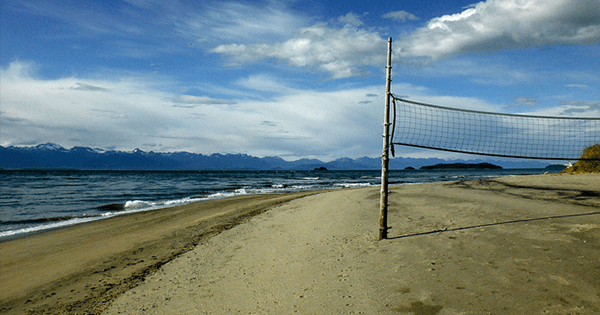
Earlier this week, my girls and I met a couple of friends and their kids for an afternoon at the beach. I drove to the bottom of a recently paved road and looked out across the water from the top of the trail down to the beach. A large swell was sending big waves to shore. And smoke from a wildfire up the highway cast a haze on the mountains across the bay, turning them blue.
My kids and I found my friend Chris near the bottom of the trail, sitting on a beach blanket with her feet bare, wearing a tank dress. For a moment I was taken aback. Where was I? Some balmy seaside town in the Lower 48? Here in Homer, a cold wind usually whips off the 50-something-degree bay on even the sunniest summer days. Summer beach clothes typically include a hoodie or a light down jacket. But there was only a gentle westerly coming at us, and it was warm. The warmth was lovely and, until I sat down beside Chris and she handed me a beer, a bit disorienting.
The kids yanked off their clothes and threw on their swimsuits. Another friend, Deb, showed up with her kids and a cooler full of snacks and small bottles of white wine. The kids wandered to the edge of the surf, which was loud and beautiful. The tide was going out, revealing huge barnacle-covered rocks, and we realized we hadn’t picked a great place to swim.
The kids didn’t mind. The boulders became their fortresses as the waves frothed around them. They waded thigh deep and screamed. Then they picked up watermelon-sized rocks and launched them into the water.
Chris and Deb and I walked to the edge of the water in our suits as the kids decided to hit the blanket for snacks. We watched the waves—as each one curled up, a boulder stuck out of its base. We edged in cautiously. The water was not frigid. It didn’t numb our feet to pain. “It’s warm!” we shouted at each other. “I’m getting acclimated,” I called over to them. I’m not shy of swimming in cold water and know well the smarting that drives me hobbling out of the water to warm my feet. But I didn’t feel that. This was unusual.
Our kids know nothing else. It’s the adults, of course, who feel the disconnect. This isn’t the Alaska we moved to. This warm weather and the warmer than average bay make for priceless afternoons at the beach. But warming temperatures are hitched, of course, to all sorts of horrible things, from seabird die-offs to wildfires to the wholesale transformation of local fisheries. My friends and I managed to avoid rocks as we dunked our heads under water while wide fronds of kelp wound around our ankles.
The kids ran along sandy passages between boulders until they arrived at a huge sandbar that had just emerged as the tide had ebbed. This was the swimming we’d been waiting for. The waves had shrunk, and now the water was free of rocks, the bottom sandy and soft.
Such is life in the new Alaska, where on sunny afternoons, you can meet friends on the beach, spread out a blanket, and swim. It is wonderful, and it is alarming. My friends and I discuss over and over again how lucky we are—how lucky that it’s a five-minute drive to a relatively wild beach where we can swim and our kids can spend hours in the water until we drag them out blue-lipped for dinner. How lucky that our kids know how to be outside for hours on end, and that the beach offers a million things for them to do: throw rocks, build damns, make fairy houses with driftwood in the sand. How lucky to live in this still bountiful and fairly undeveloped place.
But beneath this utter gratefulness I wonder: How long before climate change transforms everything we know about life here? It is on these beautiful, hazy beach days that I consider this question the most.

